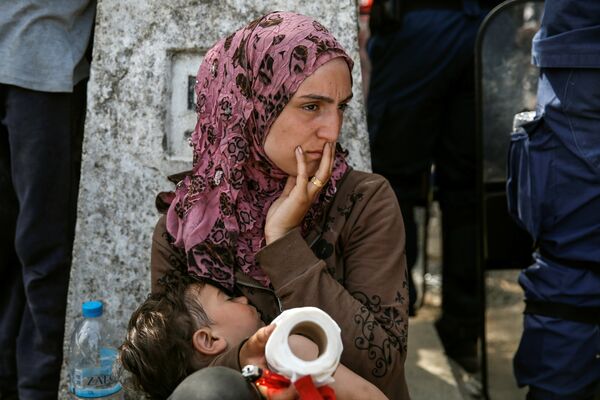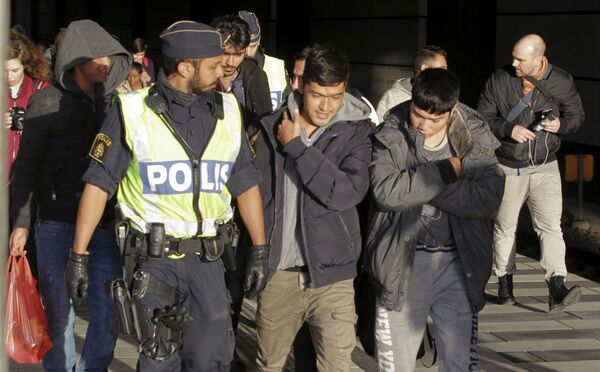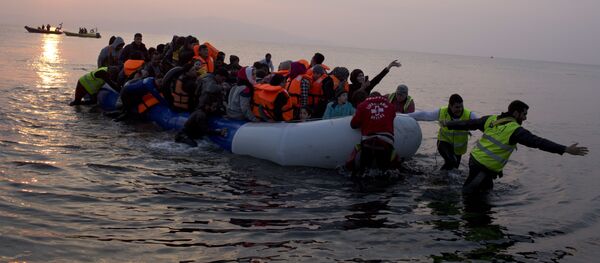Oxfam has published a report concluding the European Union and its member states have made almost no effort to increase options for safe and regular migration, and show insufficient concern about the implications their policies have on the human rights and living conditions of asylum seekers in the EU and at its borders.
As a result, the charity giant argues EU migration policy needs an "urgent shift in direction" in order to respect the bloc's alleged dedication to human rights.
#MigrationEU policies sacrifice human rights & people's safety on short-term political altar: https://t.co/nANSD5h2gl Change is needed! pic.twitter.com/GYezFCe9FA
— Oxfam International (@Oxfam) October 11, 2017
The charity states that after two years of policies directed by the EU Migration Agenda, EU institutions and member states have disproportionately focused on blocking irregular migration and reinforcing borders, while paying little attention to long-term, sustainable solutions.
Oxfam stated it has received reports of authorities physically attacking migrants at the Hungarian and Croatian borders, women and children being exposed to the risk of abuse in migration "hotspots" in Greece and Italy, and individuals prevented from fleeing torture and rape in Libya, which the charity claims are all a result of EU policies.

The report offers "guidelines" for dealing with migration, both for external policies and for managing migration inside the EU, and warns against the use of development work and humanitarian aid "to tackle migration." The success of development policies cannot be measured in terms of the number of people crossing or not crossing the borders, the authors say.
We need a global solution to protect the lives of refugees and migrants around the world. Act now: https://t.co/DpIO3ymVYl pic.twitter.com/fVYjrJA0Q8
— Oxfam International (@Oxfam) October 11, 2017
The report also calls for a continuation of search and rescue operations in the Mediterranean to save lives, despite Brussels and national governments alike discouraging NGOs from conducting such operations — and for increased "safe and regular mobility options." Although the EU is in theory open to constructing regular channels for asylum seekers, and also for regular labor migration, the charity feels very little has been done thus far.
Among the guidelines for managing migration inside the EU, Oxfam appeals against the detention of asylum seekers, which "has become the norm rather than the exception," and demands families of recognized asylum seekers are helped to reunite, as the EU Dublin regulation states.
Tit For Tat
In August, Gianmatteo Ferrari, a member of the Italian Lega Nord party, likewise criticized the EU's migration policy — on the converse basis it rendered attempts to enhance the internal security of the bloc "useless."
Ferrari spoke in the wake of the Barcelona terror attack, but while that strike may not have been perpetrated by a recent refugee, incidents elsewhere in Europe suggest asylum seekers have committed acts of violence against citizens and authorities.
For instance, in Sweden, staff at the country's Migration Board have experienced rising levels of abuse and threats, in response to asylum application rejections, with female employees being stalked and threatened with rape. During the first nine months of 2017, 2,875 incidents of abuse against immigration authorities were reported, a significant spike in comparison to previous years.

Only 510 incidents were reported in 2013 — rising to 948 in 2014, then 1,671 in 2015 and 2,808 in 2016.
During the period, 72 cases of pure physical violence were reported, almost double the 43 cases reported in 2016.
The day after the Barcelona attack, an asylum seeker in Turku, Finland carried out knife attacks that killed two and injured eight, leading the government to equip all police patrol units with submachine guns and draw up plans to rewrite citizenship laws and criminalize the harboring of undocumented migrants.
Pawel Soloch, head of the Polish National Security Bureau, has said such attacks demonstrate the Polish government's decision to refuse accepting migrants under the EU relocation scheme was justified.



